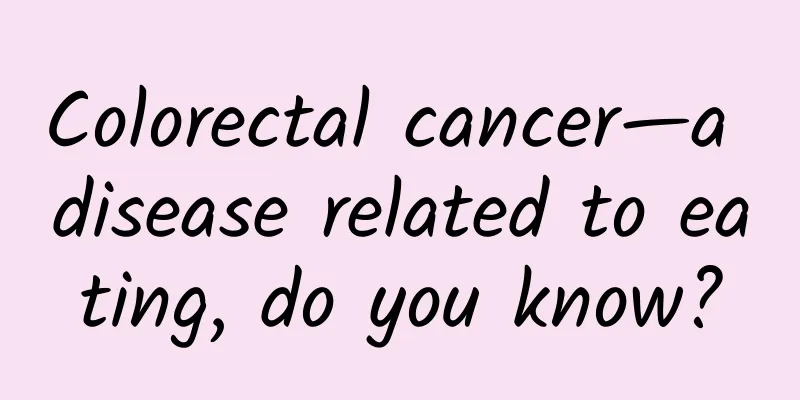Colorectal cancer—a disease related to eating, do you know?

|
This is the 3504th article of Da Yi Xiao Hu Many people may not know much about colorectal cancer. In fact, it is a disease closely related to eating. Why is this? This is mainly because carcinogens in the diet and environment can change the way genes are expressed in the gastrointestinal tract, leading to colon polyps and the possibility of further development into cancer. It has now become one of the major diseases that threaten human life and health, because its incidence rate has climbed to third place among malignant tumors in the world, while its mortality rate ranks second; in China, in 2020 alone, there were more than 550,000 new cases of colorectal cancer in China, accounting for 12.2% of the number of newly diagnosed cancers in China, and 248,000 deaths, which means that every 2 minutes there are 2 new cases of colorectal cancer and 1 person dies from colorectal cancer. Although colorectal cancer can occur at any age, in the past, 90% of patients were over 40 years old, and only those over 50 years old needed to worry about colorectal cancer. However, this situation has been quietly changing in recent years. This cancer, which used to be mainly caused by the middle-aged and elderly, has quietly "targeted" young people in their 30s, showing a trend of younger people, which cannot but arouse the attention and vigilance of the whole society. So, which groups of people are more likely to be diagnosed with colorectal cancer? One is male The incidence and mortality rates of men are higher than those of women. The incidence rate of men is 1.2 times that of women, while the mortality rate of men is 1.7 times that of women. Second, age As age increases, the risk of cancer also increases, especially in people over 40 years old, so it is recommended to start colorectal cancer screening at the age of 45; 3. There is a family history of heredity The incidence rate of people with a family history of colorectal cancer is higher than that of the general population; Fourth, people with unhealthy lifestyles Such as sitting for long periods of time, obesity, smoking and drinking, high-fat diet, insufficient dietary fiber intake, etc.; Fifth, people who often have intestinal discomfort symptoms Such as abdominal pain, bloating, diarrhea, constipation, etc. Seeing this, some people may feel a little uneasy, as one or two of these high-risk factors seem to be related to them. However, there is no need to worry too much. According to a study published in the American Journal of Clinical Nutrition, regardless of whether your genetic risk is high or low, if you maintain a healthy lifestyle, your risk of colorectal cancer will be greatly reduced [1]. So what should we do in our daily diet and life? How can we better prevent colorectal cancer? First, eat more fruits and vegetables: Related studies have shown that eating green vegetables and fiber can reduce the risk of colon cancer by half [2]. This is because fresh fruits and vegetables contain a lot of vitamins and dietary fiber. Dietary fiber can increase intestinal motility, increase stool volume, and dilute carcinogens in the colon. If you are a meat lover, it is recommended that you reduce the intake of processed meat and red meat, preferably keeping it below 4 times a week; at the same time, appropriately increase the proportion of coarse grains and whole grains in the staple food, and it should not be too fine or refined. Exercise more and avoid sitting for long periods of time. Lack of exercise, long periods of sitting, and obesity will increase the risk of colorectal cancer. It is recommended that you spend less than 3 hours a day sitting or lying down to watch TV or other electronic screen-based entertainment activities; Actively prevent and treat various intestinal diseases, such as various polyps, chronic enteritis, etc., especially intestinal polyps. Do not be afraid to seek medical treatment. Habitual constipation should also be actively dealt with, and attention should be paid to maintaining smooth bowel movements. Finally, it is important to quit smoking, limit sugar intake, and avoid consuming alcohol and other stimulating beverages[3]. References: 1 Jungyoon Choi, et al. Healthy lifestyles, genetic modifiers, and colorectal cancer risk: a prospective cohort study in the UK Biobank. The American Journal of Clinical Nutrition, 2021. DOI: https://doi.org/10.1093/ajcn/nqaa404. 2 AuneD, etal. Dietary fiber, wholegrains, and risk of colorectal cancer: systematic review and dose-response meta-analysis of prospective studies. British Medical Journal. 2011;343:d6617. 3 Six Ways to Lower Your Risk for Colorectal Cancer. Retrieved February 5, 2021, from https://www.cancer.org/latest-news/six-ways-to-lower-your-risk-for-colon-cancer.html. Author: Department of Clinical Nutrition, Tongji Hospital, Shanghai Li Yingjie |
<<: What is the nutritional value of brandy? How much is brandy
Recommend
What is the normal hcg value when not pregnant?
How much is hcg worth when you are not pregnant? ...
Mood changes during early pregnancy
In the early stages of pregnancy, the hormones in...
What to do if a woman bleeds after having an IUD inserted
Nowadays, many married women go to the hospital t...
What should I pay attention to when doing non-invasive DNA
What should be paid attention to before doing min...
What preparations should be made in the early stages of pregnancy
We all know that being able to conceive a healthy...
What causes stomach pain and diarrhea during confinement?
Confinement is a very special stage for women, an...
How to relieve breast pain before menstruation
Many women experience breast pain before menstrua...
Can I eat scrambled eggs with tomatoes after an abortion?
Nowadays, abortion is still very common, but abor...
How to solve the problem of smaller breasts after giving birth
Many female friends want to have particularly big...
Purple cervix
If the cervix is found to be purple during the ...
Does prostatitis affect pregnancy?
According to surveys in recent years, the inciden...
When will Train to Busan 2 be released in South Korea? Will Gong Yoo be in Train to Busan 2?
"Train to Busan" is one of the most wel...
This mental illness with a very high mortality rate is quietly finding Chinese women
Right-angled shoulders, ant waist, the belly butt...
What are the remedies for crying during confinement?
The mentality of the mother during confinement is...









